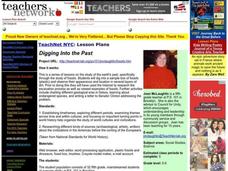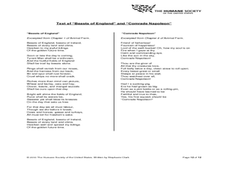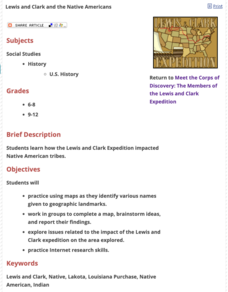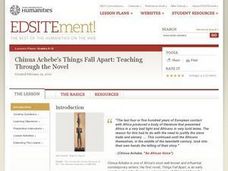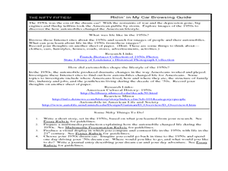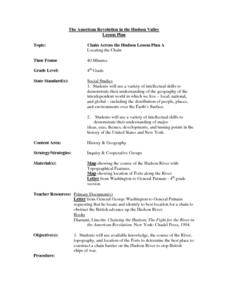Curated OER
Vietnam: A Divided Nation
Eleventh graders examine events leading up to and during the Vietnam War. They research assigned topics utilizing interviews, Powerpoint presentations, timelines, and collages in their presentations.
Curated OER
1968: Year of Social Change and Turning Point in Vietnam and the United States
Eleventh graders examine the year 1968 in Vietnam and the United States. They work together to research events which they create a timeline. They also read primary source documents of veterans of the Vietnam War.
Curated OER
Exploring the Renaissance and Reformation
Students examine the effects of the Renaissance and Reformation on Europe. In groups, they use the internet researching their section of the project and take notes of information. They create a visual aid and present their findings to...
Curated OER
Digging Into the Past
Fifth graders study fossils and how they are charted. For this fossil lesson plan, 5th graders research the excavation process of discovering fossils, and view fossils. They then do a hands on activity that involves plastic fossils that...
Curated OER
The Sixties Protests and Social Change
Students identify, examine and analyze photographs of the sixties to determine the forces of social change at work in America during this decade. They determine the goals of each movement and the methods used by each to achieve those goals.
Curated OER
Lesson 2: The Story of Flagstaff
Students, in groups, write and perform a skit that retells the story of the flooding of Flagstaff.
Curated OER
Macbeth Madness
Students participate in various social studies activities in correlation to William Shakespeare's Macbeth. In this Macbeth lesson, students study maps of Scotland, England, and Norway to identify locations mentioned in Macbeth. Students...
Curated OER
Civil Rights and the Michigan Supreme Court II
Students view a PowerPoint presentation on the Michigan Supreme Court Historical Society's Civil Rights and/or the Native American Rights. They write a reaction paper and prepare for a class discussion. They work in groups and discuss...
Curated OER
The Second Amendment and the Right to Bear Arms
Students interpret the Second Amendment. In this U.S. Constitution lesson, students examine the right to bear arms as they compare 2 Michigan Supreme Court cases and discuss their personal interpretations of the amendment.
Curated OER
Québec Sovereignty – Oui ou Non?
Students examine the Quebec question. In this Quebec lesson, students research issues related to Quebec's sovereignty. Student then participate in a videotaped debate on the issue.
Curated OER
Breakfast of Champions
Second graders classify foods using the food pyramid and write about the foods they eat. They distinguish between healthy and junk food and make healthy choices for their meals. They listen to the story "No Peas for Nellie" and discuss...
Curated OER
Local and Global Sustainability Unit
Students examine the characteristics that define a sustainable community at the local and global level. They create and prioritize a list of traits, read and discuss a magazine article, and create a poster.
Curated OER
Social Studies: Devastating Diseases
Students are able to critically read literature addressing historical data and answer relevant questions. They are able to formulate an opinion and support it using all knowledge documented and learned in this and previous lessons.
Curated OER
Animal Farm - The Rest of the Story
Students participate in a reader's theater using farm animals in the novella Animal Farm. In this Animal Farm lesson plan, students evaluate interpretations using the text, personal experience, and historical events.
Curated OER
Learning About Guatemala Through Its Kites
Students are introduced to Guatemala and to the tradition of giant kites. They decorate the kite sail and construct the kite. Students identifies possible causal factors contributing to given historical events.
Curated OER
Gandhi's Salt March, A Simulation
Students examine Gandhi's Salt March. In this peace and tolerance lesson, students discuss the Salt Tax Levy that was imposed in India. Students then debate how the Indian National Congress should have handled the issue.
Rutgers University
African-Americans in WWII
Using transcripts of interviews of African-Americans who served in WWII, class members work in pairs to understand their experience. Prior to the group work, the teacher provides background on WWII and the African-American experience....
Curated OER
Lewis and Clark and the Native Americans
Young scholars practice using maps and identifying landmarks on the Lewis and Clark expedition. They research Lewis and Clark's relationship with the Native Americans and report their findings to the class. They identify the impact of...
Curated OER
Early Exploration of North America
Third graders "travel" from Europe to North America as Columbus did. They organize the information into chronoglogical order.
Curated OER
Chinua Achebe's Things Fall Apart: Teaching Through the Novel
Students are introduced to Chinua Achebe's first novel and to his views on the role of the writer in his or her society. It can be used alone or in conjunction with the related lesson Chinua Achebe's Things Fall Apart.
Curated OER
Sybil Ludington's Ride - a poem
Fourth graders examine the role a teen from the Hudson Valley played in the American Revolution. They view the map of Sybil's ride and calculate the distance using the map's legend.
Curated OER
Wings, Chrome, and Tailfins: Automobiles of the 1950s
Pupils study the automobile industry. For this cultural history lesson, students explore 1950s America as they view a teacher-created PowerPoint presentation regarding the 1950s. Pupils research how the automobile changed the 1950s...
Curated OER
A Whaling Voyage
Students plot the track of a whaling voyage and relate it to ocean currents. They need to explain and use latitude and longitude to plot ship positions on the globe.
Curated OER
Chain Across the Hudson Lesson Plan A - Locating the Chain
Students read a letter from George Washington requesting them to identify on a map a location that would stop the advance of British warships. They choose a location and justify their choice.





